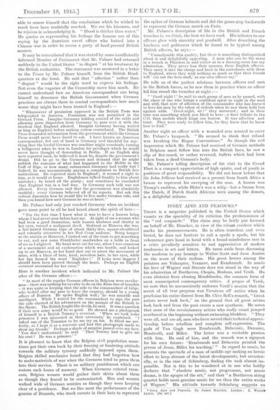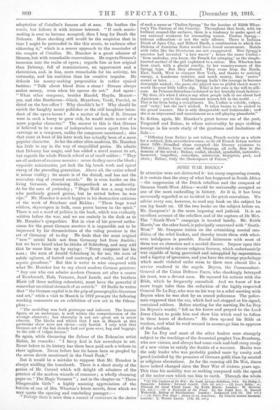IVORY APES AND PEACOCKS.*
MIME is a magazine published in the United States which vaunt; as the speciality of its criticism the predominance of the " red corpuscle." This claim May be fairly put forward on behalf of Mr. Huneker, in view of the robust candour which marks his pronouncements. He is often truculent and even brutal, he does not hesitate to call a spade a spade, but his vehemence goes hand in hand with a broad-mindedness rare in a critic peculiarly sensitive to and appreciative of modern tendencies in art and letters. He turns aside from discussing the moderns to pay homage to Walter Scott and Jane Austen on the score of their realism. His great heroes among the painters are Velazquez, Vermeer, and Rembrandt. In music his love of Wagner and Strauss does not stand in the way of his admiration of Beethoven, Chopin, Brahma, and Verdi. He even abstains from abusing Mendelssohn, the common form of most emancipated contemporary critics. A propoe of Verdi, we note that he unconsciously endorses Verdi's maxim that the secret of all true progress was Toritianw all' entice when he proclaims his entire dissent from Mr. Clive Bell's remark, " Great artists never look back," on the ground that all great artists look back and from the past create a new synthesis. He notes that none of the revolutionary artists who really count jumped overboard in the beginning without swimming-bladders. " They were all, and are all, men who have served their technical appren- ticeship before rebellion and complete self-expression. The gods of Van Gogh were Rembrandt, Delacroix, Daumier, Montieelli, and Millet. The latter was a veritable passion with him. Ho said of him, and the remark was a signpost for his own future: 'Rembrandt and Delaeroix painted the person of Jesus, Millet his teaching.' " In regard to music, he presents the spectacle of a man of middle ago making an heroic effort to keep abreast of the latest developments, but occasion- ally, as in the case of Schonberg, finding the task almost im- possible. Nor is this to be wondered at in one who boldly declares that " absolute music, not programme, not music: drama, is the apogeceof the art," and that " a Beethoven string quartet holds more genuine music for me than the entire works of Wagner." His attitude towards Schonberg suggests an • Ivory Apes and Peacocks, By James Hawker. London ; T, Werne. Limit). [Cc net.] adaptation of Catullus's famous odi et amo. He loathes the music, but follows it with intense interest. " If such music- making is ever to become accepted, then I long for Death the Releaser. More shocking still would be the suspicion that in time I might be persuaded to like this music, to embrace after abhorring it," which is a nearer approach to the remainder of
the couplet of Catullus. Mr. Huneker is a great admirer of Strauss; but with remarkable reservations. He regrets Strauss's incursion into the realm of opera ; regards him as less original
than Debussy, full of reminiscences, an opportunist and a
rhetorician, and, in fine, more remarkable for his activity, his virtuosity, and his ambition than his creative impulse. He defends his money-making propensities in rather cynical fashion: "Talk about Mood from a stone I Strauss always nsakes money, even when his operas do not." And again : " What other composer, besides Handel, Haydn, Mozart— yes, and also Beethoven—Gluck, Meyerbeer, Verdi, Puccini, so doted on the box-office t Why shouldn't he ? Why should he enrich the haughty music publisher or the still haughtier inten- dant of the opera-house ? As a matter of fact, if R. Strauss were in such a hurry to grow rich, he would write music of a more popular character." The answer to this is that Strauss is believed to be a man of independent means apart from his earnings as a composer, unlike the composers mentioned.; also that some at least of his later work has actually been of a more popular character. As for the other ultra-moderns, Mr. Huneker has little to say in the way of unqualified praise. He admits
that Debussy has magic, and has added a novel nuance to art, but regards the whole French school as of small calibre : " They are all makers of anxious mosaics : never do they carve the block ; exquisite miniaturists, yet lack the big brush work and epieal sweep of the preceding generation. Above ail, the entire school ifOninus virility ; its music is of the distaff, and has not the masculine ring of crossed swords." He is even harder on the living Germans, dismissing Humperdinck as a, mediocrity.
As for the men of yesterday ; " Hugo Wolf was a song writer who perilously grazed genius, but he rotted before he was Title." Mr. Huneker is much happier in his destructive criticism of the work of Bruckner and Mahler : " These huge tonal edifices, skyscrapers in bulk, soon prove barren to the spirit." There is not a word of politics in the book, which was evidently
written before the war, and we are entirely in the dark as to Mr. Huneker's sympathies. But in view of his general enthu-
siasm for the great German masters it is impossible not to be impressed by his denunciations of the ruling passions in the art of Germany of to-day He finds that the most original " new " music hails not from Germany but from Austria; ?nit wo have heard what he thinks of Schonberg, and may add that he sums him up by saying : " Every composer has his aura ; the aura of Arnold Schonberg is, for me, the aura of subtle ugliness, of hatred and contempt, of cruelty, and of the
mystic grandiose." But this is water to wine compared with what Mr. Huneker has to say about modem German painters: " Any one who can admire modem German art after a course of Rembrandt, Hale, Vermeer, Josef Israels, and the brothers
Marie (all three melting colourists), must have the powerful if somewhat uncritical stomach of an ostrich." Of Berlin he writes that " the German capital is in the grip of pomographie literature
and art.," while a visit to Munich in 1912 prompts the following
scathing comments on an exhibition of new art in the Odeon- platz :— -" The modelling was both grotesque and indecent. The human figure, as an arabesque, is well within• the comprehension of the average observer ; but obscenity is not art—great art' is never obscene. The blacks and whites that I saw in Munich at this particular show were not clever—only bestial. I only wish that German art of the last decade had not gone over, bag and baggage, to the side of vulgar license."
So again, while discussing the Salome of the Bohemian artist Rubin, he remarks : " I fancy foul is fair nowadays in art. Never before in its history has there been paid such a. tribute to
sheer ugliness. Never before has its house been so peopled by the seven devils mentioned in the Good Book."
But it would be a mistake to suppose that Mr. Huneker is always wielding the tomahawk. There is a short study of the genius of Mr. Conrad which will delight all admirers of the greatest of the modern wizards of romance ; a wholly charming paper on " The Magic Vermeer " ; and in the chapter on " Three Disagreeable Girls " a highly amusing appreciation of the heroine of one of Mrs. Wheaten's latest novels, from which we
may quote the opening and concluding passages :---- " Perhaps there is More than a nuancb of caricature in the choice of such a name as Undine Spragg' for the heroine of Edith Whar- ton's The Custom of the Country. Throughout that book, with its brilliant enamel-like surfaces, there is a tendency to make sport of our national weakness for resounding names. Undine Spragg- hideous collocation—is not the only offence. There is Indiana Frusk of Apex City, and Millard Binoh, a combination in which the Dickens of American Notes would have found amusement. Hotels with titles like the Stentorian aro not exaggerated. Miss Spragg's ancestor had invented ' a hair waver' ; hence the name 'incline : ' from undoolay, you knew, the French for crimping,' as the 'simple- hearted mother of the girl explained to a suitor. Mrs. Wharton has been cruel, with a glacial cruelty, to her countrywomen of the Spragg type. But they abound. They come from the North, East, South, West to conquer New York, and thanks to untiring energy, a handsome exterior, and much money, they ' arrive sooner or later. . . . "incline Spragg hadn't the courage to become downright wicked; the game she played was so pitiful thatit wasn't worth the poor little tallow-dip. What is her own is the will-to-silli- ness. As Princess Estradina exclaimed in her brutally frank fashion My dear, it's what I always say when people talk to me about fast Americans ; you're the only innocent women left in the world. . . This is far from being a compliment. No, Undine is voluble, vulgar, and ' catty,' but she isn't wicked. Tt takes brains to be wicked in the grand manner. She is only disagreeable and fashionable ; and she is as impersonal and monotonous as a self-playing pianoforte."
In fiction, again, Mr. Huneker's great heroes are of the past, Turgenieff and Balzac, to whose universality he pays striking homage iu his acute study of the greatness and limitations of Zola :- "Differing from Balzac in not taking French society as a whole for a subject, Zola nevertheless owes, as do all French fiction writers since 1830—Stendhal alone excepted—his literary existence to Balzae ; Balzac, from whom all blessings, all evils, flow in the domain of the novel ; Balza; realist, idealist, symbolist, naturalist, humorist, tragedian, comedian, aristocrat, bourgeois, poet, and cleric ; Balzac, truly the Shakespeare of France."











































 Previous page
Previous page